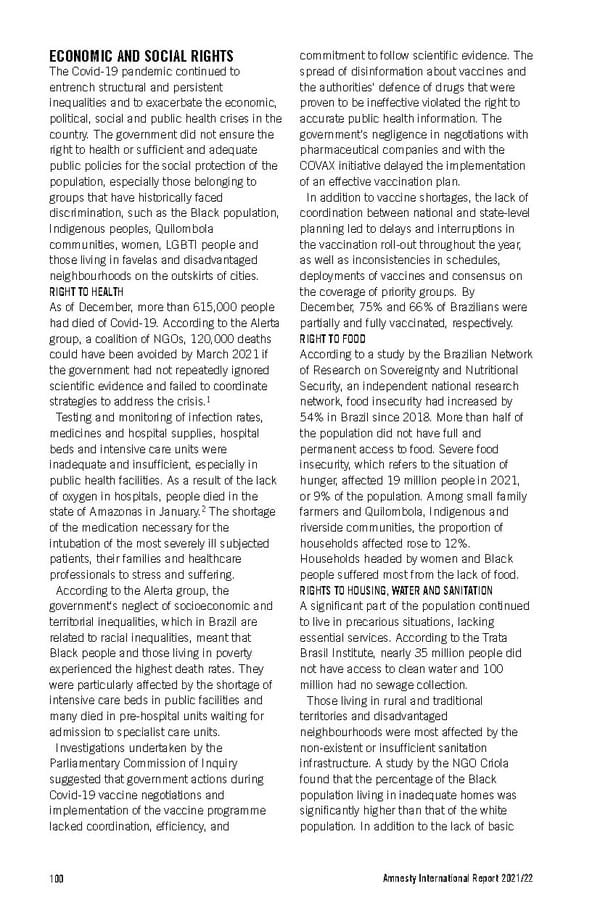commitment to follow scientific evidence. The ECONOMIC AND SOCIAL RIGHTS The Covid-19 pandemic continued to spread of disinformation about vaccines and entrench structural and persistent the authorities’ defence of drugs that were inequalities and to exacerbate the economic, proven to be ineffective violated the right to political, social and public health crises in the accurate public health information. The country. The government did not ensure the government's negligence in negotiations with right to health or sufficient and adequate pharmaceutical companies and with the public policies for the social protection of the COVAX initiative delayed the implementation population, especially those belonging to of an effective vaccination plan. groups that have historically faced In addition to vaccine shortages, the lack of discrimination, such as the Black population, coordination between national and state-level Indigenous peoples, Quilombola planning led to delays and interruptions in communities, women, LGBTI people and the vaccination roll-out throughout the year, those living in favelas and disadvantaged as well as inconsistencies in schedules, neighbourhoods on the outskirts of cities. deployments of vaccines and consensus on RIGHT TO HEALTH the coverage of priority groups. By As of December, more than 615,000 people December, 75% and 66% of Brazilians were had died of Covid-19. According to the Alerta partially and fully vaccinated, respectively. group, a coalition of NGOs, 120,000 deaths RIGHT TO FOOD could have been avoided by March 2021 if According to a study by the Brazilian Network the government had not repeatedly ignored of Research on Sovereignty and Nutritional scientific evidence and failed to coordinate Security, an independent national research 1 strategies to address the crisis. network, food insecurity had increased by Testing and monitoring of infection rates, 54% in Brazil since 2018. More than half of medicines and hospital supplies, hospital the population did not have full and beds and intensive care units were permanent access to food. Severe food inadequate and insufficient, especially in insecurity, which refers to the situation of public health facilities. As a result of the lack hunger, affected 19 million people in 2021, of oxygen in hospitals, people died in the or 9% of the population. Among small family 2 state of Amazonas in January. The shortage farmers and Quilombola, Indigenous and of the medication necessary for the riverside communities, the proportion of intubation of the most severely ill subjected households affected rose to 12%. patients, their families and healthcare Households headed by women and Black professionals to stress and suffering. people suffered most from the lack of food. According to the Alerta group, the RIGHTS TO HOUSING, WATER AND SANITATION government's neglect of socioeconomic and A significant part of the population continued territorial inequalities, which in Brazil are to live in precarious situations, lacking related to racial inequalities, meant that essential services. According to the Trata Black people and those living in poverty Brasil Institute, nearly 35 million people did experienced the highest death rates. They not have access to clean water and 100 were particularly affected by the shortage of million had no sewage collection. intensive care beds in public facilities and Those living in rural and traditional many died in pre-hospital units waiting for territories and disadvantaged admission to specialist care units. neighbourhoods were most affected by the Investigations undertaken by the non-existent or insufficient sanitation Parliamentary Commission of Inquiry infrastructure. A study by the NGO Criola suggested that government actions during found that the percentage of the Black Covid-19 vaccine negotiations and population living in inadequate homes was implementation of the vaccine programme significantly higher than that of the white lacked coordination, efficiency, and population. In addition to the lack of basic Amnesty International Report 2021/22 100
 Amnesty International Report 2021/22 Page 99 Page 101
Amnesty International Report 2021/22 Page 99 Page 101